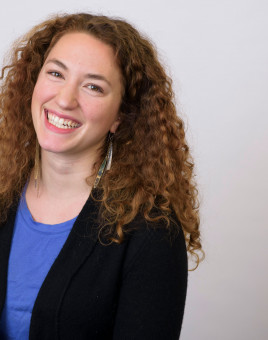
Ayala Sherman
Program / Year
Master of Arts ’20
Marriage, Couple, and Family Therapy
Hometown
Portland, OR
What led you to enroll at Lewis and Clark's Graduate School of Education and Counseling?
The drive to further my education to become a social justice oriented therapist.
Who or what inspired you to pursue your chosen field of study?
I am inspired by my family, and all the families I have worked with and all the relationships I’ve been a part of and witnessed throughout my life. I was inspired to pursue the MCFT program specifically because of my curiosity about family relationships, the relationship system of a family, and how larger systems (political, cultural, etc.) influence and affect families and relationships.
What does social justice mean to you?
Social justice is a couple of words that encompass a vast and complex range of issues. Simply, social justice is the concept of equality not dependent on race, socioeconomic status, gender, sexuality, age, ability, mental health status, etc. We know that the world is far from being socially just, so to me, striving for social justice means learning about oppressive systems, learning about cultures different from my own, engaging with diversity, examining my own biases or blind spots (constantly), and using my privilege to fight against oppression.
How do you hope to apply your social justice education in your chosen career?
I came into this program with some knowledge about social justice, and a brain that saw systems, and how they related and impacted people. As I continue through this program, my education is expanding, and I am learning how to talk more clearly about these issues, and tools for how to work with them to help people. The social justice lens is becoming less of a lens, and more melded with my eye. As I move into my career I don’t see how I could possibly not use this social justice education as it has become inextricable from me. I hope to use my knowledge of these issues to help people consider how they could become less constricted or free from systemically oppressive systems.
Where have you been working/interning as a student, and what does that work entail?
I worked at the Parry Center for Children (PCC) for a year before starting the program and throughout my first semester, though I no longer work there. PCC is a psychiatric residential facility that serves 5-18 year olds. I worked as a skills trainer in the unit that housed the youngest group of children (5-11). I managed crisis, taught interpersonal skills, emotional awareness and communication, hygiene, and other basic skills. This work was invaluable on my path to becoming a MCFT student and future therapist. I look forward to more experiences working in the field.
What is the most fun part of your program?
The most fun part of the program for me is all the unique people in my cohort, and what each person brings to class; their passions, interests, and mental frameworks.
What is the hardest part of your program?
The hardest part of the program thus far has been slightly different each semester. Hard aspects include when assignments pile up (time management), the emotional demands of the content in some classes, and pushing out of my comfort zones and exploring untouched parts of myself.
How would you describe your graduate school experience in one sentence?
Graduate school thus far has been a stimulating challenge that continues to push me academically and emotionally towards my goal of becoming a therapist.
Who has been your most influential professor, and why?
I don’t think I could pick just one! Each professor I have had so far in the program has been passionate, caring, knowledgable, and unique.
What career will you be pursuing after graduation? Did you intend for this to be your career path when you enrolled?
Post graduation I will be pursuing a career as a family therapist with a focus on children, which was my goal when entering the program.
Graduate School of Education and Counseling is located in Rogers Hall.
MSC: 93
email graddean@lclark.edu
voice 503-768-6000
Dean Scott Fletcher
Graduate School of Education and Counseling
Lewis & Clark
615 S. Palatine Hill Road MSC 93
Portland OR 97219